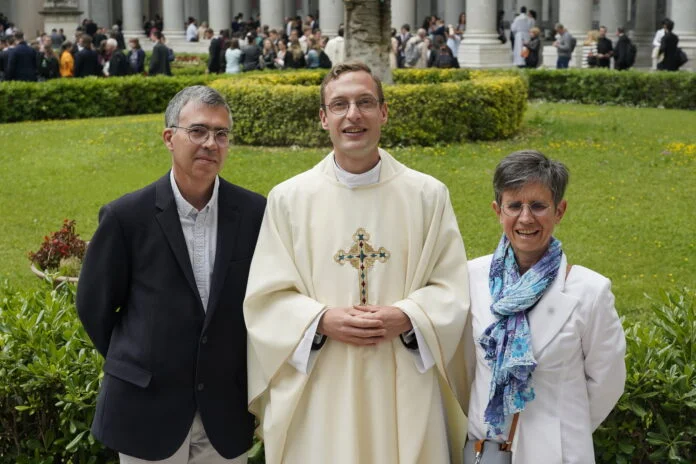Father Matthieu Boo d’Arc, LC, has been appointed as the new rector of the Vocational (Apostolic) Center in Curitiba. He replaces Father Sérgio Espinosa, L.C., who has been sent on a mission to Mexico.
The Communications Office of the Brazil Territory has interviewed Father Matthieu to learn more about his missionary work in Brazil and especially about the human and Christian formation of children and adolescents. We reproduce the interview (you can read the original version in Portuguese):
Father Matthieu Boo d’Arc, L.C., began his life in the Legion of Christ at the minor seminary of Méry sur Marne, France, in 2004. After attending the diocesan seminary of Ars, he entered the Legionaries of Christ novitiate in Italy at age 17. He made his perpetual vows in 2019 and was ordained a priest in 2022, in Rome. Between 2015 and 2018, he worked as an educator at two Regnum Christi schools in Mexico and collaborated with ECYD and adult pastoral work of Regnum Christi. Since 2021, he has been on mission in Curitiba, Brazil, where he was appointed rector of the minor seminary after three years as a secondary school formation director.
1- Can you briefly describe what the Vocational Center is?
The Maria Mãe Imaculada Vocational Center, founded in 1992 in Curitiba, is a boarding school where we welcome teenagers from age 13 up to the end of high school who wish to discern a possible vocation to the priesthood.
Currently, we have 25 students on this path. They live here at the minor seminary, study here and at Everest College of Regnum Christi, and are accompanied by three priests who serve as formators in their daily lives. At the end of high school, those who wish and qualify can enter the Legion of Christ novitiate or another seminary. The rest continue their studies where God calls them. Each year, roughly three young people from Apostolic work go to the Legionaries of Christ Novitiate.
2- Today we hear about “Vocational Center,” “apostolic school,” “minor seminary,” are they all the same?
Yes. We can use all three terms. “Minor seminary” is easier to understand. “Apostolic school” is a traditional name for religious congregations to indicate our reality, that is, teenagers preparing to enter religious life, and of course, “Vocational Center” is also used, as it is the current official name.
3- What is your mission as rector of the Vocational Center?
The rector of a minor seminary (or vocational center) is responsible for everything, even indirectly. He admits students, interacts with families, oversees the formation and discernment of students, supervises academic performance, ensures basic care, such as food, for example. Thanks to God, I can count on a team of Legionaries (three priests) and laypeople, teachers, and staff who work very well in the mission itself.
4- What is the typical schedule of a seminary rector?
It varies greatly depending on the day and the reality of the seminary. The basic pattern is the same: wake up early to pray, celebrate Mass, and often guide the students in prayer. Then comes a very varied work period: meetings with formators, religion or Latin classes, contact with benefactors, house management, etc. After lunch with the students, formative or administrative activities are carried out, preparation for apostolates, or formation of the boys. All this is periodically alternated with moments of prayer, the liturgy of the hours in particular, the rosary, and occasionally moments of sports or rest. After dinner, if the day was fruitful, you can dedicate yourself to prayer and reflection. If not, which happens often, you have two more hours of work before prayer to finish what remains.
5- Can a 13 or 14-year-old boy already know his vocation for the rest of his life?
We do not ask an adolescent to decide about their entire life. Certainly, God calls from a young age—often before age 10! Here, boys as young as 9 or 10 arrive who want to be priests and are very clear about it! Clearly, this decision is made with the maturity of a child or adolescent, and we expect nothing more from him. The minor seminary is for discernment and preparation for entering the novitiate or major seminary. The final steps will come later, after many years of formation and prayer.
6- What is the main challenge faced today in Brazil in educating true Christian adolescents?
The question is very good: the adolescents who come here to the seminary are not better or different from the rest! The first challenge is their human and Christian formation, before they can think about a vocation. Today, especially, the great difficulty we face is the lack of formation of the will: adolescents have often been educated with little demand, thinking that the ideal is to do what they want. And, unfortunately, parents are often responsible for this. The boy arrives at the seminary with a “poorly formed” will, little capacity for effort, and easily becomes discouraged at the first difficulty. One of the greatest joys of a coach is when we manage to help the boy enjoy difficult rewards, achievements that require effort to reach. This is a great foundation for a holy and full life.
7- What is the importance of minor seminaries? Shouldn’t vocational training focus on older, more mature youth?
It is true that we must offer older youth a vocational path. However, I am convinced that today, in the Western world, minor seminaries are more necessary than before, when they were more abundant. Society is so aggressive, pornography and drugs are accessible, ideologies are present in schools from childhood… All this quickly destroys a boy who may feel a call from God. In fact, it destroys any boy. Priests who also work with young adults see many young people arriving very broken, psychologically and emotionally wounded. Because of this, it is no longer possible to live a healthy consecrated and community vocation. If we do not offer parents and the Church a healthy, Christian environment free of ideologies, so that adolescents become happy, full, mature young people seeking holiness, perhaps it will be too late later.
Of course, it is important to emphasize that the model of minor seminary today is no longer the same as 20 or 50 years ago. In the Legion, we have developed a new model that values the balance between family life and boarding school, with study, prayer, formation, and freedom.
8- Every year, the Vocational Center sends two or three young people to the novitiate. Is it worth investing so many priests and so much money for such a small result?
Currently, our minor seminary has four priests, three formators, and a vocations promoter, with about 25 students. If each year we send two or three young people to the major seminary, this means that in 20 years, more than 50 young men will have entered the novitiate. It more than compensates the invested priests. Regarding the financial aspect, I agree that there is an investment. But how much is a priest worth? We invest in the future of the Church, in the salvation of souls, in your future confessor, in the priest who will baptize your children. And that is priceless.
9- What would you recommend to parents who hear their children say “I want to be a priest”?
First, you need to have faith. The child does not belong to us; it is God who entrusts us with him to lead him to happiness and heaven. Who are we to set conditions on God’s plan? So, you must understand that the call is often a hidden and confusing intuition, which must be accompanied by much prayer and love, without pressure. Parents who can help their children grow in their Christian and prayer life are already helping them discern their vocation. Finally, it is important to find a priest, a religious person, someone who can guide your child in discovering his vocation.












